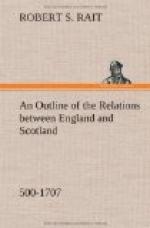David, as we have seen, had been brought up under Norman influences, and it is under the son of the Saxon Margaret that the bloodless Norman conquest of Scotland took place. Edgar had recognized the new English nobility and settlers by addressing charters to all in his kingdom, “both Scots and English”; his brother, David, speaks of “French and English, Scots and Galwegians”. The charters are, of course, addressed to barons and land-owners, and their evidence refers to the English and Anglo-Norman nobility. The Norman fascination, which had been turned to such good account in England, in Italy, and in the Holy Land, had completely vanquished such English prepossessions as David might have inherited from his mother. Normans, like the Bruces and the Fitzalans (afterwards the Stewarts), came to David’s court and received from him grants of land. The number of Norman signatures that attest his charters show that his entourage was mainly Norman. He was a very devout Church-man (a “sair sanct for the Crown” as James VI called him), and Norman prelate and Norman abbot helped to increase the total of Norman influence. He transformed Scotland into a feudal country, gave grants of land by feudal tenure, summoned a great council on the feudal principle, and attempted to create such a monarchy as that of which Henry I was laying the foundations. There can be little doubt that this strong Norman influence helped to prepare the Scottish people for the French alliance; but its more immediate effect was to bring about the existence of an anti-national nobility. These great Norman names were to become great in Scottish story; but it required a long process to make their bearers, in any sense, Scotsmen. Most of them had come from England, many of them held lands in England, and none of them could be expected to feel any real difference between themselves and their English fellows.
During the reign of Henry I, Anglo-Norman influences thus worked a great change in Scotland. On Henry’s death, David, as the uncle of the Empress Matilda, immediately took up arms on her behalf. Stephen, with the wisdom which characterized the beginning of his reign, came to terms with him at Durham. David did not personally acknowledge the usurper, but his son, Henry, did him homage for Huntingdon and some possessions in the north (1136). In the following year, David claimed Northumberland for Henry as the representative of Siward, and, on Stephen’s refusal, again adopted the cause of the empress. The usual invasion of England followed, and after some months of ravaging, a short truce, and a slight Scottish victory gained at Clitheroe on the Ribble, in June, 1138, the final result was David’s great defeat in the battle of the Standard, fought near Northallerton on the 22nd August, 1138.




